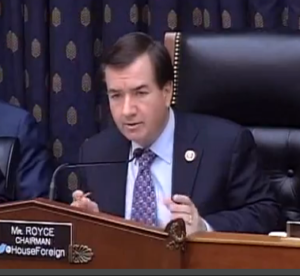BBG Watch Commentary
 Rep. Ed Royce (R-CA) said that U.S. broadcasters – the Voice of America, Radio Free Europe / Radio Liberty, Radio Free Asia and others – “are competing with a hand tied behind their back … “because of the bureaucratic structure over top of these radios.”
Rep. Ed Royce (R-CA) said that U.S. broadcasters – the Voice of America, Radio Free Europe / Radio Liberty, Radio Free Asia and others – “are competing with a hand tied behind their back … “because of the bureaucratic structure over top of these radios.”
Rep. Royce was referring to the Broadcasting Board of Governors (BBG). The agency’s powerful bureaucratic structure, which has grown 37% in the number of positions in the last seven years despite cuts to broadcasts and news programs and which controls 34% of the BBG budget, is the International Broadcasting Bureau (IBB). Critics blame its former executives for derailing the agency, but they also blame current senior Voice of America managers for ignoring the VOA Charter, making news reporting defunct, and destroying employee morale.
Today, the House Foreign Affairs Committee unanimously passed bipartisan reform legislation to improve the missions, objectives, and effectiveness of U.S. international broadcasters.
As the legislation was being voted on, international audiences got yet another example of how mismanaged Voice of America has become. According to BBG Watch sources, VOA executives went behind closed doors to decide how to report on the broadcasting reform legislation because it reflected poorly on their management performance. They failed, however, to arrange for coverage of Vice President Biden’s speech at the Atlantic Council, in which he discussed Russia, Ukraine, and NATO security guarantees in Central and Eastern Europe. During the speech, Vice President Biden made a news announcement that President Obama will visit Poland and two West European NATO allies in June. VOA did not report this news for four hours and when it did, it used a short news item from Reuters without any information about the substance of Vice President Biden’s remarks about Ukraine, Russia, and NATO.
See: As effort to reform Voice of America starts in Congress, VOA uses Reuters to report on Obama Europe trip, is four hours late, BBG Watch, April 30, 2014. This BBG Watch report also includes the text of remarks on the U.S. broadcasting reform legislation by the House Foreign Affairs Committee Ranking Member Rep. Eliot Engel (D-NY).
Chairman Royce Opening Statement at Markup of U.S. International Broadcast Reform Legislation
Opening Statement of the Honorable Ed Royce (R-CA), Chairman
House Committee on Foreign Affairs
Markup of H.R. 4490, the United States International Communications Reform Act of 2014 April 30, 2014
(As prepared for delivery)
Let me begin by thanking Ranking Member Engel for his work in moving this bipartisan bill forward.
The two of us, and others on the Committee, have just returned from Ukraine. That visit underscored the need to reform U.S. international broadcasting. Traveling to Eastern Ukraine, our delegation witnessed the Russian propaganda machine – now in overdrive – and its attempts to undermine regional stability. The Russian closure of local Ukrainian radio and television stations and the jamming of uncensored sources of information demands an effective response. This Committee recently worked on legislation – signed into law – to ramp up programing into Ukraine.
But unfortunately, U.S. broadcasters – the Voice of America, Radio Free Europe, Radio Free Asia and others – are competing with a hand tied behind their back. That’s because the bureaucratic structure over top of these radios – the Broadcasting Board of Governors (“BBG”) – is broken.
So while our enemies are working 24/7 on their public information campaigns, the organization at the helm of ours meets once a month. That’s a recipe for failure. Indeed, then-Secretary Clinton told this Committee last year that the BBG is “practically defunct.” Reports from the Inspector General and GAO have agreed. As does nearly everyone with experience in this field, Republicans and Democrats alike.
This legislation makes dramatic changes to the current organization by clarifying the missions of our U.S. international broadcasters – consolidating six organizations into two.
One organization – “The United States International Communications Agency” – will remain a federal entity and will consist of the Voice of America and the associated technical services our broadcasters depend on. We make clear that the mission of the Voice of America is to “present the policies of the United States clearly and effectively” – exactly as it was intended.
Radio Free Europe, Radio Free Asia, and the Middle East Broadcasting Network, the so-called “surrogates,” have a different mission: to provide uncensored local news and information to people in closed societies and to be “a megaphone for internal advocates of freedom,” whether it’s in Iran, North Korea or elsewhere. These “freedom broadcasters” will keep their names, but consolidate into a private, nonprofit corporation that will become the “Freedom News Network.”
Both the U.S. International Communications Agency and Freedom News Network will now have empowered CEOs – and purely advisory boards. Ripping away the bureaucracy will reduce administrative overlap and allow both organizations to thrive. This legislation also mandates important reforms to the contracting practices of the BBG, and increases public-private partnerships.
Unlike decades past, today’s media landscape is highly competitive. Other countries are sprinting forward, but we are standing still. If we’re going to adapt, we need a more effective and efficient use of our finite resources, which this legislation lays out through its mission clarification and management reform.
Again, I want to thank Ranking Member Engel, who I will now turn to for his remarks.
